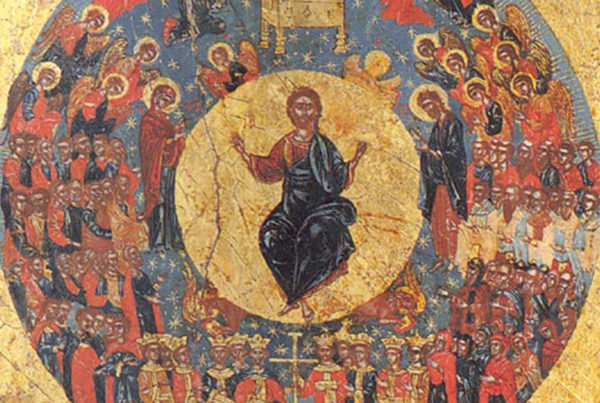“How long O Lord…why have you rejected us?”
The Bible has always played a central and pivotal role in my spirituality. I meet God in the text of Scripture and move out with him from the text of Scripture into my life, walking with him in the ebb and flow of the everyday. For me, there is no tension or division between being a man of the text, a mystic, and a missionary. It’s all of one piece. The God that is “rendered” in Scripture (with all of his angularities, riddles, and peculiarities) is the God I love and meet and do my work with.
It is a lamentable fact that more and more people do not read the Bible. This is not just a matter of the “laity” either. I would guess that many if not MOST of those who lead our churches do not really read the Bible with any degree of seriousness any more. The practical result of this can only be that our conception of God will be – WILL BE – powerfully determined by something other than the bracing testimony of Israel and the Church. It will also undoubtedly be a much smaller, culturally limited, and narrow god than the God we would have if we made Scripture a pathway to understanding and communion. The practical result of THAT is a shrunken humanness and vapid corporate spirituality. We will worship the god of the Right or the god of the Left; an uninterested (and uninterestING) Force or flimsy pile of Benevolent Foam; a Stern Taskmaster or a Nameless Fate.
But the Bible, over against these thin rival philosophies and narrow politicized theologies, invites us into a living, sometimes transcendentally joyful, often tempestuous, always honest relationship with a living God who condescends to be in covenant with us–shock of it all–involving us in his life, always and forever taking us seriously not as tools to be used or “energies” to be assimilated but as sons and daughters who are also heirs, even as a Bride who will share in the Majesty and Glory of her Bridegroom, the King.
There is, therefore, ample and abundant space for us to be human. For our hearts to swell with celebration and gratitude, for our souls to rage with disappointment and frustration, all while somehow avoiding sloppy sentimentalism or foolish insolence. Within this More Interesting Character, there is space to “live and move and have our being.” We are neither shut up in servile quietude nor absorbed and therefore annihilated in his Being. Through the testimony of Israel and the Church, we are welcomed rather into the depths of Christ Jesus, the True Man, the Last Adam, God of very God, who lives always to the Father and dignifies and ushers us by our union with him into glories nearly too great even to speak of. We may shake our fist at heaven one moment (“My God, my God, why have you forsaken…???”) and fall down in adoration the next (“Whom have I in heaven but you…???). All of it made possible by the More Interesting Character rendered for us through the Biblical text, the God of Abraham, Isaac, and Jacob–the Father of our Lord Jesus Christ.
There is a trend in North American Christianity these days to “reframe” what we mean by the authority of Scripture. And fair enough, I say, for much harm has been done by people who claim too glibly the “absolute authority of the Word of God” (which happens quite often to be their own peculiar take on it). But I can almost guarantee that the law of unintended consequences will take over in this case, and therefore the to-be-expected result of this is that people will in fact take the Bible far less seriously for life and spirituality and faith and all the rest than they currently do, which is already not-very-serious.
Any so-called “reframing” that does not lead us to take the Bible MORE seriously should, I suggest, be dismissed out of hand. For the practical result of this glib and arrogant dismissal of Israel and the Church’s testimony will inevitably be a “god” powerfully determined by something else, a god less interesting, less powerful, less peculiar, and less able to lead us into the stunning and breathtaking humanness of the Incarnate One, Christ Jesus, the Son of the Father.




Haha! You ended a sentence with a preposition. 🙂
Seriously, though, it is something I have been writing a book about, not the consequences of seeing God or reading the Bible in a less serious way (though that is certainly a part of it), but the notion that we don’t see God the way we should. He can be a cosmic vending machine, smiting tyrant, topic of study (meaning we know about Him, but don’t have a relationship with Him), or several other things.
The difficulty of writing the book, however, is not in going over our false images of God, but in coming up with a correct view of God. To an extent, I know that it is impossible to come up with a complete view of God, for He is infinite and “we are but dust,” just as I know that a correct view of God is unlikely to be extracted by one man and, even if we assume it is possible, my heart is still human and would wage war against this view, corrupting it if I am not eternally vigilant. That said, what I have seen of the true person of God is fascinating.
So now I will get to my two real thoughts on the topic:
1. It seems that many people have a one-dimensional view of God. He is a Judge or a Creator or a Savior or a Teacher. They may recognize on an intellectual level that He is all of these things (and many more), but their hearts tend to see Him in just one way. Even if their view of Him in that way is correct, though, a failure to believe in our hearts that He is all of these things leads not only to missing out on so many wonderful aspects of God, but to an understanding of your view of Him that is less than complete, even in that area. For example, seeing God as a Savior without seeing Him as a holy and righteous Judge means missing out on a part of why He sacrificed Himself for us and on what it meant for Him to do so.
2. The true God is so fascinating that we are always supposed to be enamored with Him. I just got in a relationship a couple months ago and I’m still finding out new things about her from time to time. All of them, even the bad ones, fascinate me. Our relationship is not in the pure infatuation stage anymore, but some of that is still there, mixed with the deeper emotions and commitments we’ve made. I firmly believe it should be like that with God, but to an even greater degree. Because He is infinitely complex, we can never hope to understand Him completely or perfectly, at least not on earth. It means there’s always more to discover, more treasures to find, more secrets to reveal, more facets of His personality to see. Our relationship with Him only gets boring when we believe there’s either nothing left that’s new or when we don’t believe that the new is better than what is in front of us.
My two cents.
-Ness
Agreed my man! Thanks for responding.
Wonderful. May we be constantly surprised and taken aback by the Living God. And may we be shocked into worship as we sense and participate in the movements of this Living God around us.
Yes. Amen. So be it.
This is great stuff bro. I completely agree. I feel this is how I had come to view Holy Scripture when we first met you guys-in a very unserious way- if you recall that’s when I took a sabbatical from reading Scripture, to rewire and reprogram myself. Through some authors you recommended, as well as running into the Church fathers I soon came to view all scripture through the lense of Christ-as they did-thus unlocking a door to viewing it correctly. IMHO I feel the style of reading Holy Scripture has become quite unholy. Though it is the cheif and in some cases only place in a community where beliefs are derived, it has become a sort of grab-bag/self help for every occasion instead of a holy book to be venerated and carefully and heartfully read.
Miss you guys!